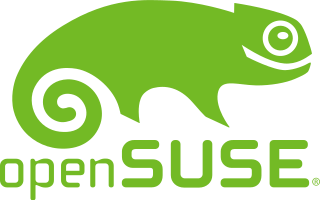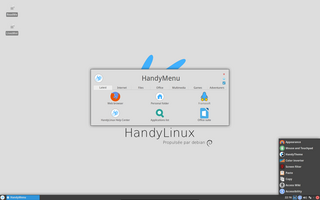
A Linux distribution is an operating system made from a software collection that includes the Linux kernel and often a package management system. Linux users usually obtain their operating system by downloading one of the Linux distributions, which are available for a wide variety of systems ranging from embedded devices and personal computers to powerful supercomputers.

Xandros, Inc. was a software company which sold Xandros Desktop, a Linux distribution. The name Xandros was derived from the X Window System and the Greek island of Andros. Xandros was founded in May 2001 by Linux Global Partners. The company was headquartered in New York City with its development office in Ottawa, Canada.
Libranet was an operating system based on Debian.

A light-weight Linux distribution is one that uses lower memory and/or has less processor-speed requirements than a more "feature-rich" Linux distribution. The lower demands on hardware ideally result in a more responsive machine, and/or allow devices with fewer system resources to be used productively. The lower memory and/or processor-speed requirements are achieved by avoiding software bloat, i.e. by leaving out features that are perceived to have little or no practical use or advantage, or for which there is no or low demand.
Technical variations of Linux distributions include support for different hardware devices and systems or software package configurations. Organizational differences may be motivated by historical reasons. Other criteria include security, including how quickly security upgrades are available; ease of package management; and number of packages available.
CPython is the reference implementation of the Python programming language. Written in C and Python, CPython is the default and most widely used implementation of the Python language.

openSUSE is a free and open-source Linux distribution developed by the openSUSE project. It is offered in two main variations: Tumbleweed, an upstream rolling release distribution, and Leap, a stable release distribution which is sourced from SUSE Linux Enterprise.

gNewSense was a Linux distribution, active from 2006 to 2016. It was based on Debian, and developed with sponsorship from the Free Software Foundation. Its goal was user-friendliness, but with all proprietary and non-free software removed. The Free Software Foundation considered gNewSense to be composed entirely of free software.
SUSE Linux is a computer operating system developed by SUSE. It is built on top of the free and open-source Linux kernel and is distributed with system and application software from other open source projects. SUSE Linux is of German origin, its name being an acronym of "Software und System-Entwicklung", and it was mainly developed in Europe. The first version appeared in early 1994, making SUSE one of the oldest existing commercial distributions. It is known for its YaST configuration tool.
Black Lab Linux is a discontinued free software Linux distribution for x86 and x86-64 hardware. It was first released in November 2013 by PC/OpenSystems LLC. Black Lab Linux is based on Ubuntu Linux tailored both for general desktop use and for the more technical user. It is commercially made available by PC/OpenSystems LLC for business desktops, education facilities, as well as parallel computing.
Digital Cornerstone was a Linux and open source software company based in San Diego, California. It primarily targeted desktop computers with its flagship Linux distribution, Linspire. It was bought in 2008 by Xandros, Inc., a former competitor, and made a semi-independent subsidiary of the company.

EasyPeasy was a Linux-based operating system for netbooks. EasyPeasy was built upon Debian and Ubuntu, but was customized for low-powered computers and access to web applications. EasyPeasy is maintained as an open source project, though it primarily uses popular web applications or proprietary software over free and open source software alternatives when the functionality offered is deemed better by its users.

RPM Package Manager (RPM) is a free and open-source package management system. The name RPM refers to the .rpm file format and the package manager program itself. RPM was intended primarily for Linux distributions; the file format is the baseline package format of the Linux Standard Base.

According to the Free Software Foundation Latin America, Linux-libre is a modified version of the Linux kernel that contains no binary blobs, obfuscated code, or code released under proprietary licenses. In the Linux kernel, they are mostly used for proprietary firmware images. While generally redistributable, binary blobs do not give the user the freedom to audit, modify, or, consequently, redistribute their modified versions. The GNU Project keeps Linux-libre in synchronization with the mainline Linux kernel.
AppStream is an agreement between major Linux vendors to create an infrastructure for application installers on Linux and sharing of metadata.

Linspire is a commercial operating system based on Debian and Ubuntu and currently owned by PC/OpenSystems LLC. It had been owned by Linspire. Inc. from 2001 to 2008, and then by Xandros from 2008 to 2017.

SolydXK is a Dutch Linux distribution based on Debian. It aims to be simple to use, providing an environment that is stable, secure, and ideal for small businesses, non-profit organizations and home users.

HandyLinux is a simplified Linux operating system developed in France, derived from the Debian stable branch. It was designed to be easily accessible and downloadable, so that it could be used by people with very little computer experience and on a range of older hardware that was no longer supported by the latest versions of proprietary operating systems. It was particularly aimed at older people with dated hardware who do not need nor possess the skill to use many features afforded by state-of-the-art operating systems.

SparkyLinux is a desktop-oriented operating system based on the Debian operating system. The project offers a ready to use operating system with various desktops to choose from. SparkyLinux is released 3-4 times per year to provide the latest versions of all applications.













